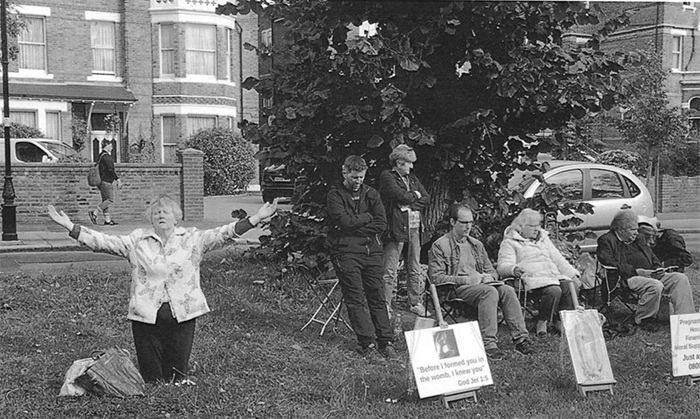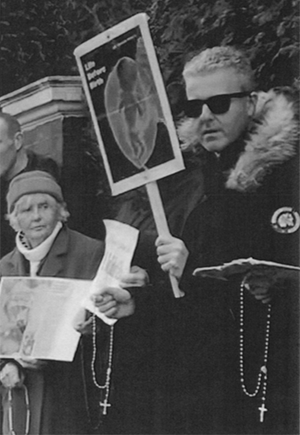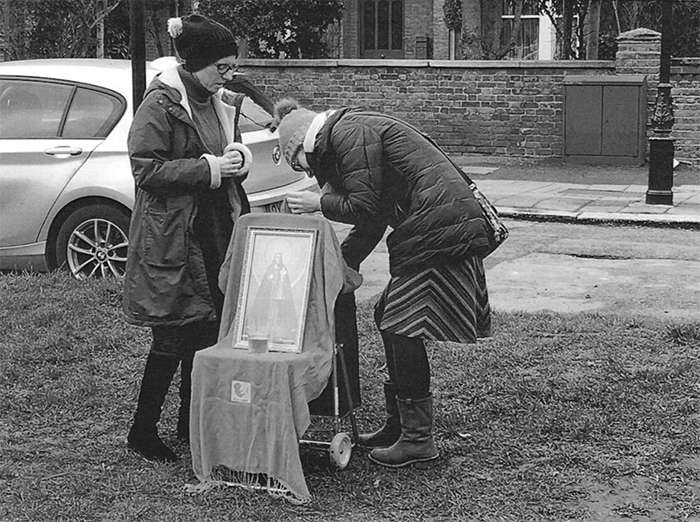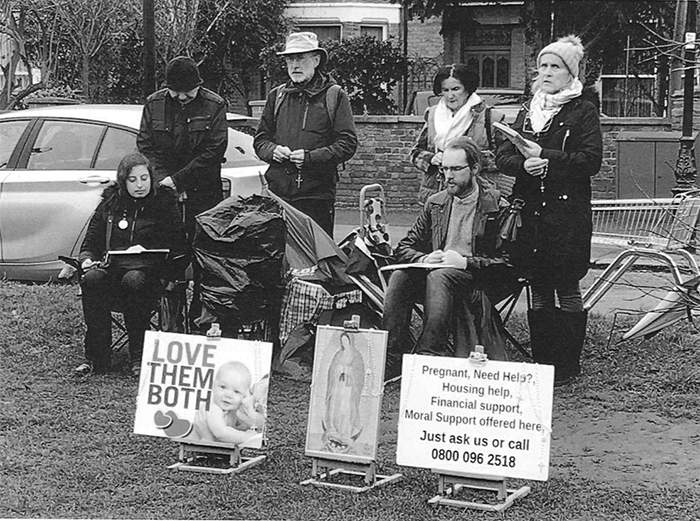Anti-social behaviour legislation allows for the arbitrary silencing of voices
[vc_row][vc_column][vc_column_text]

Photograph of pro-life protest distributed at Ealing Council meeting, 10 April 2018.
During her time as director of the Manifesto Club, Josie Appleton has dealt with many Community Protection Notice and Public Space Protection Orders being served for non-criminal reasons.
She has dealt with PSPOs for rough sleeping, begging, annoying dogs and even people moving rocks. In her view, these are cases that should be dealt with by the interested parties without the involvement local government or police.
“Once you give the state power, you do not defend victims, you make people victims of the state and that is what happening now,” she says.
The power that Appleton is referring to comes from the Anti-Social Behaviour, Crime and Policing Act 2014, which was introduced after a government white paper — Putting Victims First – More Effective Responses To Anti-Social Behaviour — found that “in some local areas, the focus is still too much on ‘management’ of individuals causing anti-social behaviour, rather than working quickly to stop problems causing serious harm to victims”. The government’s solution was to give local authorities a broad range of powers to limit people’s movements and expression in public places under the guise of stopping anti-social behaviour.

Photograph of pro-life protest distributed at Ealing Council meeting, 10 April 2018.
Two sections under the act have already been used to create orders that limit people’s freedom of expression: part two on Criminal Behaviour Orders and part four on community protection.
CBOs allow prosecutors to take an injunction against a person who has already been convicted of a crime. If the “court is satisfied, beyond reasonable doubt, that the offender has engaged in behaviour that caused or was likely to cause harassment, alarm or distress to any person,” then an order will prohibit certain activities, or require the offender to take specific actions.
In June, London’s Metropolitan Police sought and obtained a CBO preventing five members of 1011, a gang based in Ladbroke Grove, London, from making drill music, a style of rap known for its dark or violent lyrics. The order prohibits the individuals from making music videos about violence or other gang members, and from posting any songs without notifying the police in advance.
Although the court can consider evidence regarding CBOs, “it does not matter whether the evidence would have been admissible… evidence could include hearsay or bad character evidence”. This means that although violating a CBO can lead to a prison sentence up to five years, the burden of proof is lower than that required in other criminal cases brought before the court.
The other order under the act that has been used to limit freedom of expression is the Public Space Protection Order.
The PSPO is a replacement for three previous orders — Gating Orders, Designated Public Place Orders and Dog Control Orders — but it can be used for a broader range of incidents. It states that if activities carried out in an area have a “detrimental effect on the quality of life of those in the locality,” then local governments can take restrictive action.
Appleton believes one of the problems with the order is that it is so vague that the government can use it to prohibit any activity they disagree with or use it to target a specific group. “[I]s, or is likely to be” is repeated several times, meaning all that is needed is a suspicion that an action could cause harm.
While the law gives wide latitude to the local councils, it does require that there is a “particular regard to the rights of freedom of expression and freedom of assembly set out in articles 10 and 11” of the European Convention on Human Rights when deciding whether to create a PSPO.
Regardless, on 10 April Ealing Council in London passed a PSPO that restricted the actions of anti-abortion protesters around a Marie Stopes clinic. The PSPO was introduced to protect women entering the clinic. In a report written by Ealing’s Safer Community Team, it is reported that the protesters often talked to them and tried to hand them items such as rosaries, pamphlets and models of foetuses. Sometimes the pro-life groups were joined by pro-choice protesters which created a tense situation.

Photograph of pro-life protest distributed at Ealing Council meeting, 10 April 2018.
The PSPO created a buffer zone moving the protesters 100 metres away from the clinic, meaning they are too far away to talk to women entering the clinic.
The PSPO prohibits “protesting, namely engaging in any act of approval/disapproval or attempted act of approval/disapproval, with respect to issues related to abortion services, by any means. This includes but is not limited to graphic, verbal or written means, prayer or counselling”.
A report produced by the Ealing’s Safer Community Team states that they did take into account articles 8, 9, 10, 11 and 14 of ECHR, which include protections on religious belief, freedom of expression and freedom of assembly. However, they ruled that it was necessary to interfere with these rights in order to protect visitors to the clinic under the Equality Act of 2010. It also found these women to be a protected group under article 8 of ECHR (the right to private and family life).
The report also states that despite the fact that the protesters haven’t done anything worthy of persecution, council members were advised that it was not “a reason to rule out the possibility that the activities are having the requisite detrimental effect”.
Clare Mulvany, a spokesperson for the pro-life group Be Here For Me, told Index on Censorship: “The Council is undoubtedly entitled to take steps to protect women entering abortion clinics from genuine harassment and intimidation. There is not any dispute about that. However, the difficulty here is that the buffer zone goes so far beyond what is reasonable or necessary to achieve that end.”
On PSPO, Putting Victims First states: “In keeping with the Government’s desire to devolve powers to local areas, the order would allow local authorities to make decisions without the burden of having to go through central Government.”

Photograph of pro-life protest distributed at Ealing Council meeting, 10 April 2018.
“Effective criminal justice can never be about giving more power with fewer checks and balances. It doesn’t work like that,” Appleton said. “The restrictions that exist for a very good reason, they guide authority down fair and rational lines of enforcement. Once you create a free for all you do not have better justice, you have complete chaos and that is what we have now.”
Under the Anti-Social Behaviour, Crime and Policing Act, interested parties only have six weeks to make an appeal to the High Court when a new PSPO is created and the appeal can only be made under the basis that the council did not have the authority to make the order or that they did not follow all the requirements when making the order. In addition, it can be enforced with on the spot fines, meaning people don’t have an opportunity to defend themselves in court.
Alina Dulgheriu, a pro-life advocate who says she was helped by protesters when she was pregnant, decided to fight the Ealing PSPO in the High Court. She believes the PSPO “is anti-choice because it removes the chance for women to get information about other help available to them”.
She lost the case in High Court and now has a Gofundme account to raise money for an appeal.
Appleton, who identified herself as pro-choice, said: “I think it is important that people who support free speech but who disagree with the protesters oppose these PSPOs because they’re making the point that it’s not about what you think about abortion, it’s what you think about freedom that counts and these PSPOs are a restriction on assembly and expression of view in a public place.”
Although both Mulvaney and Appleton recognise the problems with the act, their respective organisations don’t have the resources to effectively campaign against it.[/vc_column_text][/vc_column][/vc_row][vc_row][vc_column][vc_basic_grid post_type=”post” max_items=”4″ element_width=”6″ grid_id=”vc_gid:1534340349208-7fb1dab2-6b19-5″ taxonomies=”26321, 8883″][/vc_column][/vc_row]
